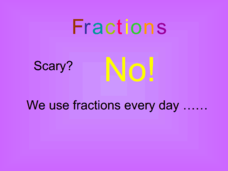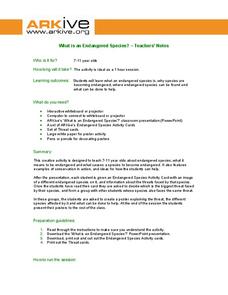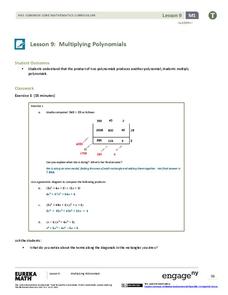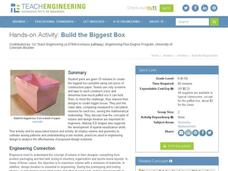Common Core Sheets
Comparing Numerically (Different Denominator)
Compare fractions with different denominators in a handy Common Core based activity. Fourth graders decide which fraction is larger or smaller based on the parts that make up a whole (denominator) and the parts being described...
EngageNY
Our Group Readers Theater: Managing the Sequence of Events in Our Group Script
The whole is greater than the sum of its parts. Working in small groups, class members combine their independent readers theater scripts into part of a larger group script. They complete a storyboard to determine the best sequence for...
Lakeshore Learning
Equivalent Fraction Activities
Spin the wheel of the fraction contraption and learn about equivalent fractions! After constructing their own spinners, kids use printable pizzas to represent fractions that are equal in value.
K5 Learning
The Blind Men and the Elephant
Sometimes it's necessary to view the whole picture before making a judgment about a small part. Read a short story about five blind men who try to identify an elephant by feeling different parts and coming to their own conclusions....
Curated OER
Simple Machines III - Pulleys
The principles behind pulleys, levers, and simple machines are the focus of a science instructional activity. In it, learners take part in a whole-class activity. There are two groups of pupils who each must lift objects with fixed...
Curated OER
Rhyming Words: The Ut Family
What a great resource! Learners can review words with short vowel sounds, such as bun, bus, and hut using this presentation. The slides are easy to understand and colorful. This would be a quick way to review these words either in a...
Curated OER
Fractions
Fractions are scary for a lot of young mathematicians. This cute presentation tries to take the "scary" out of fractions. The basics are covered: the numerator, the denominator, and the fact that a fraction is a representation of a part...
EngageNY
Revisiting Big Metaphors and Themes: Revising and Beginning to Perform Two-Voice Poems
Now that your class has read all of Esperanza Rising, take the time to tackle big metaphors and themes. Pupils will participate in an activity called Chalk Talk, in which they circulate around the room in small groups and add...
National Center for Case Study Teaching in Science
A Case Study Involving Influenza and the Influenza Vaccine
Using a hypothetical discussion between two coworkers broken up into four parts, budding biologists examine the flu shot and some of the typical arguments for and against it. The conversational nature of the reading makes it engaging and...
Brooklyn Museum
HIDE/SEEK: Difference and Desire in American Portraiture
Visual arts lessons don't always mean the children need to make art. Here, they will practice using their visual literacy skills to analyze four images through the compare and contrast method. The first two images deal with gender...
ARKive
What is an Endangered Species?
Even kids in grades two through five can start thinking about the part they play in sustaining endangered species. They consider what endangered species are, how they become endangered, and what conservationists can do to help. In...
University of Wisconsin
Designing a Rain Garden
Now it's time for all of the data collected in previous lessons to be applied to the design of a rain garden. This resource can only be used as part of the greater whole, since learners will need to rely on gathered knowledge in order to...
Smarter Balanced
Food Waste and Food Access
Forty percent of food in the US goes uneaten while 14.5 percent of US households lack a secure supply of food. As part of the preparation for a performance task assessment, groups consider statistics such as these about food waste and...
IRISS
Exploring Self-Esteem 1: What Is Self-Esteem?
Adolescents explore self-esteem and the various factors that influence a person's sense of self in this four-part lesson series. Through a combination of whole class instruction, small group discussions, and independent work,...
Willow Tree
Multiplying Polynomials
Make two parts into a whole. Scholars learn to multiply polynomials to create a simplified polynomial expression. Polynomials include monomial, binomials, and trinomials.
Missouri Department of Elementary
The Successful Student: Picturing the Successful Student
Class groups brainstorm the characteristics that make up a successful student before taking part in a whole class discussion. Assigned group roles promote member participation.
Teach Engineering
Build the Biggest Box
Boxing takes on a whole new meaning! The second installment of the three-part series has groups create lidless boxes from construction paper that can hold the most rice. After testing out their constructions, they build a new box....
PhysEdGames
Blob Tag
Have the class line up on one side of the gym. Choose one person to be the tagger. When the tagger yells "blob tag!" then the whole class runs across the gym while trying not to get tagged. Anyone that's tagged, now becomes part of the...
Concord Consortium
Exploring Protein 3D Structure
Presenting protein structure can be difficult! Take young biologists on a 3-D amino acid adventure with a detailed interactive. Pupils view and manipulate common amino acids individually or as a part of a whole protein. Choose from three...
Federal Trade Commission
Ad Creation
How would someone market a new cereal to space aliens? Using the third lesson from a four-part Admongo series on advertising, pupils learn about persuasive techniques companies use to convince consumers to purchase their products. As a...
Curated OER
Coordinates
For beginning point plotters, these graphs give a good introduction. They examine a graph with shapes drawn onto it and each vertex labeled. There are 20 total, and scholars write the coordinates of each labeled point. All of these are...
Illustrative Mathematics
The Stamp Collection
By using language like "half of the stamps," children are exposed to patterns in arithmetic that requires solving a two-step word problem. This type of language opens a new door for transitioning learners toward understanding fractions...
Illustrative Mathematics
Dana's House
Your class is to find the percent of the lot that is not covered by a house. Make sure your pupils understand the problems before they begin. The lot is the whole of the percent problem and the house is the part. The exercise is good...
Mojang
Minecraft – Pocket Edition
You don't have to be a Minecraft wiz to know that this app has great playability for your learners! As afterschool programs and classroom projects around the world demonstrate, this game goes well beyond placing blocks and traditional...
Other popular searches
- Fractional Parts of a Whole
- Fractional Parts to Whole
- Parts and Wholes
- Parts to Wholes
- Fractions as Parts of a Whole
- Fractions Parts and Wholes
- Math Parts and Wholes
- Fractions Parts of Whole
- Fractions Parts of a Whole
- Fractional Parts of One Whole
- Whole and Parts
- Math Whole and Parts























